#the long and short of the meta
Explore tagged Tumblr posts
Text
There ultimately is one question that bothers many when it comes to Will: Is Will Graham actually a bad person? (because no one knows what exactly swims around in the hot darkness of his mind, but I tried to sum it up anyway)
The thing about Will is that yes, he is certainly not a ‘good’ person. At least not after Hannibal started messing with his head, though I’m convinced Will never was in the first place. However, not only Will’s character, but pretty much the whole show is about the thin and multi-shaded line of good and bad. Moral and immoral. It’s exactly that blurry line that makes Will such an interesting protagonist. He is not the bad guy, neither is he the hero in his own story. He tried to play the roles of both (FBI agent vs killer), managed to fool even himself for a while, but Will knows very well who he is and what he was doing.
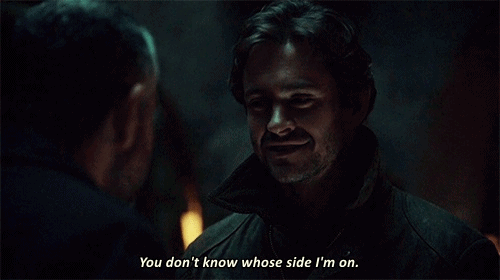
It’s an ancient question, isn’t it? What is good and what is bad? Are those two defined by societal norms and standards? Are they based on culture, religion, or is morality something personal? Something only you can decide for yourself?
I’m going to include Hannibal here for a second, because when it comes to Hannibal, the last one of those options applies. The thing with Hannibal is that he has his own philosophies, his own ideals and morals. Hannibal constantly rivals God, claiming that he himself can’t be called evil because God does the same things and isn’t considered ‘’bad’’. Hannibal has his own borders and limits very straight. He can recognise plain cruelty, but the thing with Hannibal is that he is a very stylised manifestation of sin.

Hannibal is religious, though there might not be a specific religion or deity he believes in and he worships no higher beings, he does believe in the ‘’rules’’ of certain religions. He is well aware that he crosses most of those. They hold no value for him. He makes his own rules, plays his own game. In his world, there is no ‘’good’’ or ‘’bad’’ when it comes to actual crimes against humanity. A bad person is for him someone very rude, someone who lacks respect and manners. He doesn’t consider himself a ‘’good’’ person. He is something entirely else. A way of perceiving life and his own morality that no one except from Will can truly understand.
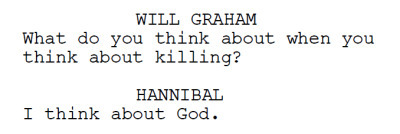
Hannibal, however, is to us a bad person. He is the ‘’ultimate bad guy’’, because the way he feels about Will doesn’t excuse the rest of his behaviour. Hannibal is a sadist, a narcissist, a manipulative and awful man. He kills and feels no remorse for most if not all of his victims. For him killing is an art, a pleasure, he delights in it. For him, that is not as ‘’bad’’ or evil as it is for us (society), though he knows he is alone in that world.
For that same reason, Hannibal doesn’t consider Will a bad person. He considers Will his equal. He knows that the both of them are deemed ‘’bad’’ people to the public, but that doesn’t matter in his world. In Hannibal’s mind, it’s just him and Will against the rest of the world. They are neither good nor evil. They simply are.
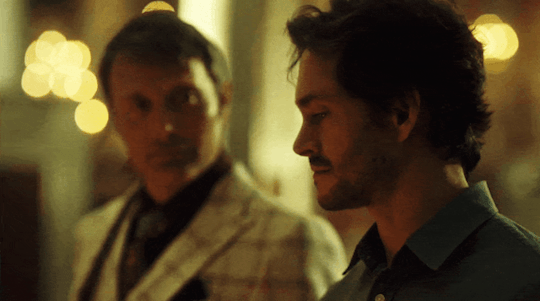
So back to Will, who understands Hannibal’s view of morality, but doesn’t necessarily think the same. If we look at it the same way as we looked at Hannibal, in a societal and common sense, yes, Will is a bad person. Can a stereotypically ‘’good’’ person like killing, even if it’s bad men? The satisfaction in killing, even if it’s a bad person, isn’t a moral thing. Someone truly ‘’good’’ would always choose punishment over murder. Then there’s also the fact that Will didn’t blink twice when he and Hannibal ate human meat and that he consumed it, knowingly, without a single complaint.
Will had no issues using innocent people (Chilton, Freddie Lounds, etc) to achieve his own goals. He is as (if not more) manipulative as Hannibal and is sometimes cruel in ways that even shocks the Chesapeake Ripper. Will made absurd sacrifices to get what he wanted, did things no stereotypically ‘’good’’ man would ever think of doing. Then I’m not even talking about maybe the simplest and most ordinary example of how little he actually cares for most things, which is his sweet wife, Molly (her son Walter, too).
However, Will did try to be good. He tried very hard. He wanted to be a good person, to save people. Will can care for others in ways Hannibal can’t. Hannibal has no moral compass, Will does. A broken one, but he does. Will wants to help people more often than he wants to hurt them (The conversation with Bedelia about crushing or saving a wounded bird is a perfect example of this. So are his needs to save dogs and Abigail.) The thing about Will is that he desired to be good. He worked for the FBI, saved many lives, because he understands pain and suffering like no other. He doesn’t wish such horrid things upon innocent people.
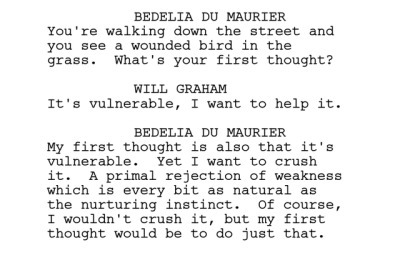
During the show, Will's morality is completely tied to Hannibal, so much that Hannibal himself and the stag even serve as metaphors for his corruption, while at the same time, his morality has nothing to do with Hannibal. Will always had dark urges. He always knew that there was something fundamentally wrong with him, with the things he wanted and was capable of doing. Perhaps that’s why he joined the police and later the FBI. He suppressed the worst of him by focusing on the best of himself. By forcing himself to save people through a job, he couldn’t afford to misbehave and do things he knew were wrong. Will’s fantasies, dreams and understanding of killers throughout the show make it very clear that he struggled with his own morality, even before Hannibal.
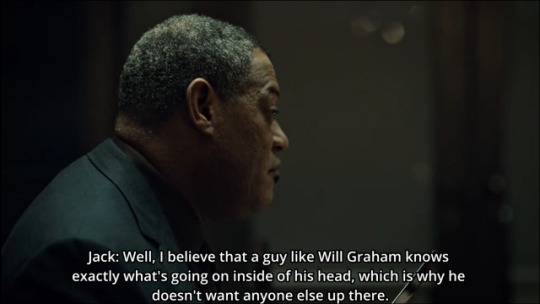
Then came, of course, Hannibal. Who fueled those urges and gave them attention. Who didn’t create them, but cared for them. Allowed them to sprout and grow until Will got entangled in such a web of situations and feelings that he couldn’t suppress them anymore. Hannibal forced Will to deal with who he really is, he broke Will’s shield. His costume, the same way Will did with Hannibal’s person suit. Hannibal is a ‘bad’ influence on Will because he brings out what’s always been inside him, but was repressed for years because Will was aware that society would label him a monster or a freak if he acted on those feelings. Will felt alone and alienated his entire life, of course he tried everything to not fall into a complete pit of loneliness and darkness.
That was until Hannibal came into his life and Will realised that there was someone who understood him, who loved him for who he really was, even (especially) his ‘darker’ side. Someone who was like him. Who understood how he felt and didn’t see him as an immoral person because of it. Will spent his whole life understanding others, but Hannibal was the first person to actually understand him in return.
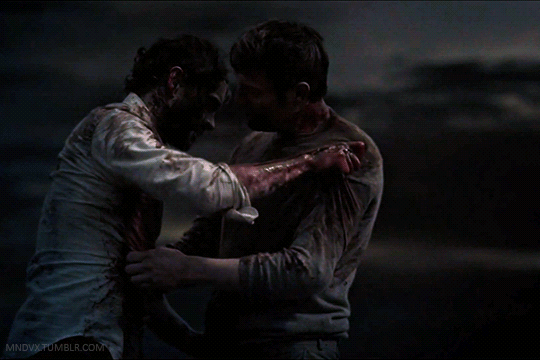
Hannibal thinks Will’s ‘worst’ side is the most beautiful version of him. Will himself is torn between what Hannibal (the one person who understands and cares for him) and society (his upbringing, religion, anyone he ever met, norms and values) think of him. He doesn’t know what to believe. He knows he’s a bad person, he doesn’t try to make himself believe he isn’t. As I said, Will still has a moral compass, he’s self conscious about the things he does.
However, there is a great possibility that Hannibal changed Will’s perception of himself. That he made Will see that there’s no need to think of himself as a bad person. Just as a person. A human with urges and desires. Who can decide for themselves whether their actions are good or bad. Law is far beneath them at this point. In the end, Will and Hannibal navigate their own morality through their perceptions of their own actions. They both have a dislike for labels. Good and bad, moral and immoral, those are all labels society has forced upon humanity. Cruelty and kindness are not. Will knows very well when he’s cruel and when he’s kind.

So my conclusion is, yes, Will Graham is stereotypically a self-conscious yet immoral person. At the ending of the series after everything has happened, at least.
But, I think that, just like Will himself, it’s up to you to decide whether he’s truly good or bad. Some people have other reasons to believe someone is one of the two than others. Some believe that if a person can love, or if they feel guilt or know what they’re doing, they aren’t a bad person. Others don’t. I think that’s entirely up to you to decide. It’s just what you like to believe, because believe me, to Will the line is just as blurry as it is to us. He is as unpredictable to Hannibal as he is for the audience. Will is a mystery of a character, certainly when it comes to his morality. And I think that that is exactly what makes him so fascinating.
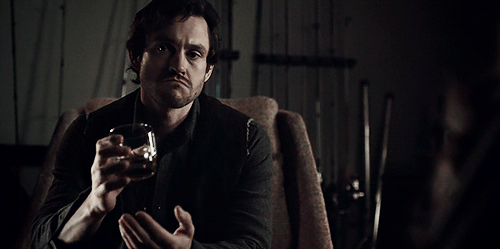
#long story short#he is a mean little bitch#who's capable of great evil to get his man#but who am i to judge#no I'm joking he's such a beautiful and layered character#I love you morally grey Will Graham#hannibal#nbc hannibal#will graham#hannibal analysis#hannibal lecter#hannigram#hannibal meta#analysis#philo
211 notes
·
View notes
Text
After everything that has happened to Johnny, his body autonomy is such a huge and interesting topic for me. It should be WAY more present in the game.
In Phantom Liberty, they barely touched the surface of his military trauma and other traumatic events throughout his life, let alone Johnny losing his human arm and getting a prosthetic that sent him over the edge with cyberpsychosis and a messed up, traumatized psyche (as if it wasn't bad enough before that).
Cyberpunk 2077 is already such a great game, but it could have been an absolute masterpiece if they let us get through to Johnny and his trauma. V tells him he's a softie and Johnny replies with a "fuck you"—because how many people have been kind to him before that, really? How many people tried to genuinely understand him, especially since he pushed them away over and over again?
The game should have allowed the player to push through his "fuck you" that is actually a defensive mechanism, his awkwardness at being seen and exposed to those human feelings. The game should have allowed the player to help Johnny, to "Don't bullshit me, Johnny, I'm here for you whether you like it or not. Don't want me? Let's go talk to Kerry. Rogue is also an option, y'know?" (And judging by the way Johnny acts during a date with Rogue, and by him telling Rogue about V's death, Johnny still trusts Rogue enough and is, to a point, ready to be vulnerable and truthful with her.)
I mean, I'm sure Johnny and Kerry had many heart-to-heart conversations, but Johnny still built up a wall and pushed people away, even Kerry (his best friend, mind you).
And after the war? Drugs, alcohol, anything to drown the pain. The way he used sex to manipulate and to cope while he was also disassociating? I mean, he already has an arm he hates, that is still a foreign object, why not use his body, too?
You've heard this from me before and you'll hear this again: Johnny Silverhand deserved better. The Temperance ending remains the best canonical ending for me—he gets that second chance at life, to heal, to live. Even though he has to live in V's body, has to get used to it and that there's no V anymore, that the body fully belongs to him now. There's another question of body autonomy because Johnny's consciousness/the Relic overwrote itself on V's psyche, so technically he stole the body and killed V without meaning to. But then again, it was V's choice to give Johnny the body. It was V's choice to tell Johnny, "Don't fuck this up. Heal. Live for me to the fullest."
And so he tries, with his immense guilt and grief. He genuinely tries, otherwise V's sacrifice was for nothing. Otherwise it was only a waste.
Of course, in my head V is alive. Johnny gets his body back, his rehab, his healing—because's Johnny's actual body is so tired, is so used to every kind of poison, he NEEDS time to heal. It's going to be a process. It's going to take years. But it's important for him to get help.
But that's not canon. Canon is that Johnny is suffering all the fucking time, lying to himself that he's good, and then during events of Phantom Liberty and any kind of heart-to-heart with V it overwhelms him to the point of him holding back tears.
"I was totally ok with that, until now."
Yeah. Sure you were, darling.
Anyway. Body autonomy for Johnny Silverhand 2k25.
#cyberpunk 2077#cb2077#johnny silverhand#kerry eurodyne#phantom liberty#long post#natiswriting#meta#cyberpunk 2077 meta#this was supposed to be a short post but oh well#they have my heart#silverv#I guess?#even though I'm not that big of a fan bc I'll always choose Kerry for Johnny over V
272 notes
·
View notes
Text
there's been all kinds of commentary on fraser's relationship with being hit on and sexuality and romance in general, and (if you'll forgive my two cents on a 30 year old show) one thing has been nagging at me after watching the episode with zuko and the church theft (s1e18 i believe?)
fraser gets thoroughly whumped in the course of this episode, as one does, but the interesting part is how the show draws parallels between the two different parties doing the whumping: namely, the mobsters, and the women pursuing fraser romantically.
as fraser is being beaten by the mobsters in the third act of the episode, there is a camera shot that lingers on his face, looking upwards: he's beaten to hell, mouth hanging open, pupils small. he can't move and he can't get free, only take the beating
less than five minutes later, at the station: fraser is laying back in elaine's chair as she dabs alcohol on the cuts on his face and he is very visibly (and unusually vocally) in pain as she does it. he stammers his way into one of his tuktoyaktuk stories, with the otter, when she asks about the scar under his collarbone, but it's obviously a shield, calling back to the opening of the episode when he literally jumped off a balcony to get away from francesca relentlessly hitting on him.
there is another camera shot, as he's laying back in the chair. he's looking up. beaten to hell, mouth open, pupils small with pain. he can't move and he can't get free- but this time he can deflect, like fraser constantly does throughout the show. we even see him do it to zuko, in the first basketball game
the episode closes (if you'll forgive the spoilers) with two paired shots of ray v and fraser, with the voiceover of fraser sr as fraser reads his journals
ray v is in his pyjamas in his bedroom, staring down at his service weapon. debating with himself over whether to keep it loaded; working through his fear, of whether he's going to live to the morning after beating up zuko. the implication is that someone might be coming for him, but both ray v and the voiceover come to the same decision: to remove the clip and lock up the gun for the night, to lay back and release the fear instead and sleep.
fraser is in his apartment, lantern lit, reading an account of his father's journals where fraser sr put away a criminal who swore to come for him, and then lay awake and heard every noise until he decided to release the fear and go to sleep.
we see the expression on his face at the lines. not quite skepticism, more 'how do i do that, dad?' 'how do i do that when i am afraid for someone else?', which goes back to fraser's issues with his father in general and how he left him behind.
and fraser lays down onto the bed and onto his back, as ray v had. and he waits, and he tries to release his fear, coming to terms with it or trying to.
and the threat that comes through the door is a beautiful woman in a short dress and lingerie, instead of a hitman; but they are framed exactly the same
#due south meta#benton fraser#ray vecchio#due south#please forgive the overly overly long meta. it just wouldn't stop nagging at me#in short: benton fraser is framed as /gay/ gay an astonishing amount in the show#(not to disregard the ace perspective which could also be applicable here)#originalbronze
46 notes
·
View notes
Note
What are your thoughts on on the comic Kingdom Come?
I think that it's one of the strongest, if not the strongest thing Mark Waid has ever written, and the second strongest project Alex Ross has been involved in (first being Marvels.) I wasn't really aware until recently of the degree to which Alex Ross was a major creative driver on that project outside of the art, which was a major shortcoming on my end. When I figured this out the throughline became apparent- Between this, Earth X, Marvels and Project Superpowers, the man loves his bittersweet superheroic gotterdammerungs, and given the baroque grandiosity of his paintings, that makes a lot of sense.
Anyway, out of all the riffs by subsequent artists that came out of people stripping Moore's Twilight of the Superheroes pitch for parts, I definitely think Kingdome Come remains one of the stronger ones. Part of this is the first-mover effect- they got it out the door before such elseworlds became like half of all published superhero books. Part of this is that Ross's interiors are fundamentally unbeatable and would be a good reason to read the book even if the story was dogshit. And partly I suspect there may have been a reining-in-George-Lucas dynamic by having Ross and Waid work together; I think that Ross can get a little gratuitous when he's the primary writer, and I say this as someone who liked Earth X on balance.
#it absolutely catches both the seinfeld effect and the fact that Superman might hit as abnormally self-absorbed compared to like#the gesalt tumblr opinion on superman#but not really terribly implausible IMO#thoughts#meta#The short and targeted length also prevents Waid having a long enough runtime to hang himself with also#ask#asks#kingdom come
33 notes
·
View notes
Text
Okay but the confirmation that the Granddaughter is supposed to have reached a state of tranquility and detachment but hasn't, and is instead aggressively and desperately shoving down all of their emotions without being able to excise them has sent them to the top of my faves list immediately.
I'm also really looking forward to seeing if the Fold wizard on deck survives whatever just happened, because I would love to find out if all Granddaughters have actually excised their emotions, or if in reality, they're supposed to be practicing tranquility but don't actually have a grasp on that until later, after their Realization. I would not be surprised to learn, especially after Artifice's whisper last episode, that this is something of an initiatory secret that isn't meant to be fully understood until later, once Realization has been had.
#as a long time spock fan. character type of all time.#yes please give me the anxiety and self doubt and feelings of failure beneath the utterly calm and controlled exterior YESSSS#honestly i think a lot of people dont take kindly to that kind of initiation cuz it can cause negative internal issues but#ngl i do like it. i do think knowledge exists that simply must be experienced to know#that cannot be conveyed before someone is ready for it and must be obscured in some way#even if it is harder to deal with in the short term#LIS student has opinions about forms of knowledge? shocker#unend spoilers#midst spoilers#unend#midst podcast#the granddaughter#midst meta
60 notes
·
View notes
Text
Okay i dont know if anyone else has pointed this out but throughout the vast majority of the ball (and honestly throughout many scenes in episode 5 as well but they don't seem as significant), Aziraphale and Crowley are on opposite sides of the screen they would normally be on. Particularly when Crowley is trying to tell Aziraphale about the demons outside the bookshop and he doesn't listen.
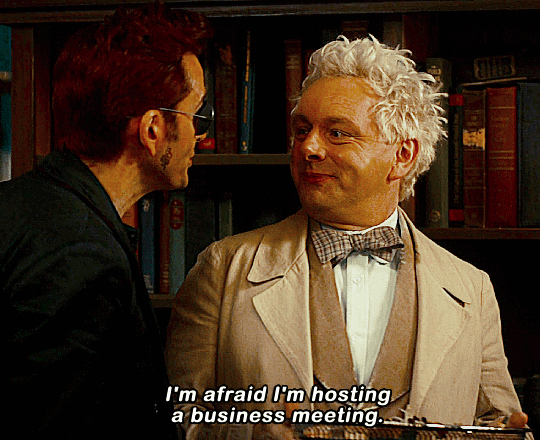
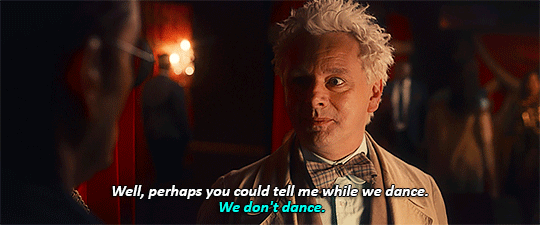
It's so interesting because this scene, in my opinion, is the crux of Aziraphale's denial and refusal to see what is actually going on and the danger of it (affectionate). The entire season we've witnessed Aziraphale downplay the real danger of hiding Gabriel in his bookshop. This is partly on Crowley, who knows more of the extent of the danger they're in and does not tell Aziraphale. BUT, we can't deny that Aziraphale is also ignoring the severity of the situation. I mean, he literally says that Crowley is overestimating the trouble they are in:
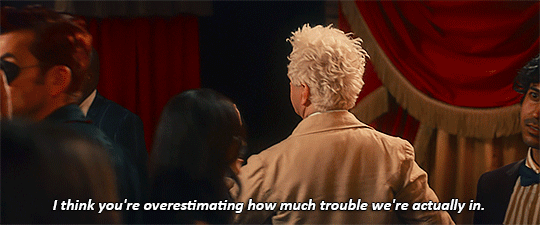
I just think it's INTERESTINGGGG. After the ball their positions return to normal and don't switch again until Episode 6 Crowley puts his sunglasses on and crosses to leave the bookshop.
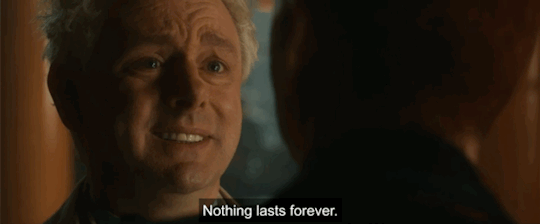

It's also an interesting moment to choose switching their places on the screen because it's the moment Aziraphale's fantasy of being in Heaven with Crowley is crushed as well. You can tell that through Crowley's confession, Aziraphale isn't listening to a word he's saying, much like during the ball. BUT the dynamic doesn't switch until Crowley has totally rejected Aziraphale's offer.
Would love to hear anyone else's opinions on this, I could be overthinking it (I am the person who spent multiple days analyzing the lengths of Crowley's sideburns in each promo photo only to discover it was just a continuity error when the actual show came out LMAO.)
#good omens#good omens 2#good omens tv#ineffable husbands#fr though crowleys sideburns gave me so much grief before s2 came out because they changed every episode#and i was trying to speculate the timeline of events#but upon watching it doesn't really matter and seems more like an error to me#they go from short to long in the middle of episode 5 (between the 'smitten' scene and talking to gabe scene)#?#ANYWAY I DIGRESS#going to bed now#not art#meta#aziraphale#crowley
553 notes
·
View notes
Text
What if Ekko and some the Firelights are the only Zaunites that came to help defend Piltover?
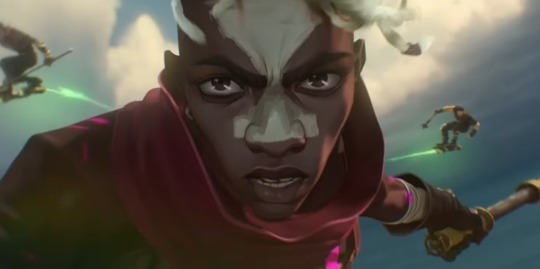
I noticed in what is supposedly the big battle between PnZ vs Noxus, we actually don't see Zaun fighters attacking Noxian forces. The only Zaunites we see fighting Noxians, or at least providing support to Piltover is Ekko and the Firelights.
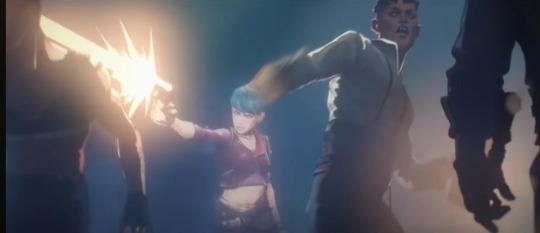
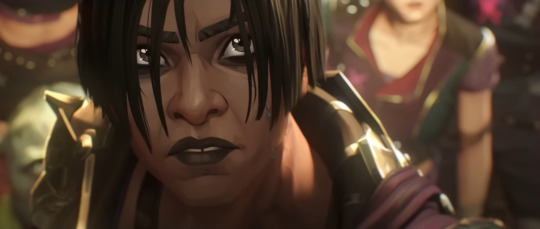
Between Ekko and the Firelights, only Ekko is wearing Jinx's X tag. From the trailer we can see that other Zaunites that rally behind Jinx or just support her either wear her pink X, dye their hair blue, or wear burgundy red (like Silco). The firelights don't dress like this, but Ekko does while he leads them in this fight. It could be a sign that they separated recently and came back together for this fight.
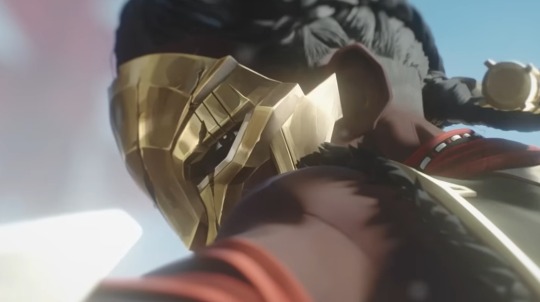
From the battle scenes we get in the trailer, it's more likely that Ambessa's forces had tried to take hold of Zaun, but were ultimately pushed out. In the shot where Ambessa's topside fighting against Piltovan enforcers, her mask is clearly damaged. If you look closely, you'll notice that there's at least three deep diagonal scratches across it.

There are only two seasoned fighters capable of leaving that kind of damage, Warwick or Sevika with her new arm (or maybe dhe got her claws back). Since I'm confident Warwick would turn Ambessa into ribbons, I think it's likely her and Sevika traded blows instead.
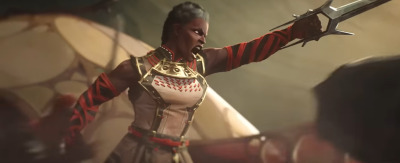
And then there's the scene where Ambessa has lead her forces in what must supposedly be Viktor's territory in the Sump. From the few shots of the place, we know there's about 6-7 people there including Viktor, and somehow they'll manage to repel Ambessa's army back?
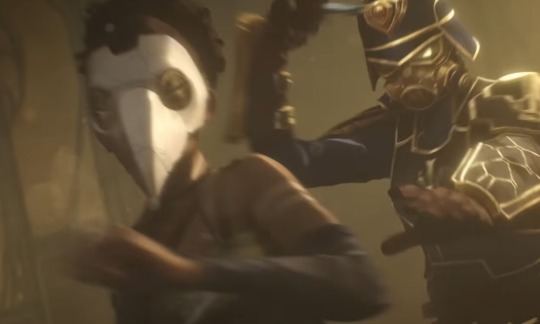
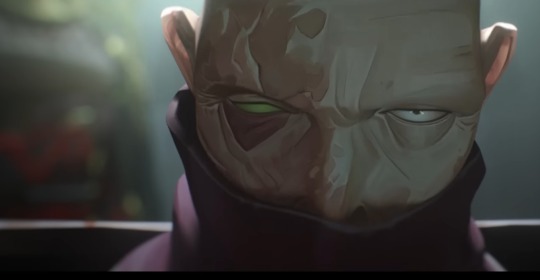
Really, all the teasers and trailers have shown that Noxus will try to occupy every level of Zaun from the Sump to the Promenade, and even in Stillwater. The battle in Piltover probably only happens once Ambessa's forces are completely pushed out of Zaun and back into Piltover, and suddenly it's Piltover's problem.
Ekko and the Firelights are probably only helping Piltover because they assume leaving Ambessa in control would make everything worse. Meanwhile Jinx, Sevika, and Viktor's factions won't see a difference between Piltover and Noxus since they were literally working together (really it's a lateral move to most), and are content to watch them fight it out.

Obviously we see Jinx in what could be an airship over Piltover, but what makes us think she's there to help?
Tldr: Jinx, Sevika, and Viktor's factions respectively when Piltover asks for aid against Noxus.

#arcane#arcane meta#ekko arcane#the firelights#zaun#piltover#ambessa medarda#i think it's too neat and tidy for all of zaun and piltover to just come together to fight noxus#as if noxus and piltover weren't long time allies#no kicking? no screaming? not even a bit of schadenfreude????????#i think the idea of helping piltover would be a key reason jinx and ekko's partnership would fal#apart#Ekko's the coded good guy so he HAS to help and jinx isn’t#so any zaunite who doesn't help is bad and short-sighted and cruel bcuz wud innocents die#shortsighted maybe but hilarious yes#i'm surprised there's no sign this isn’t all an elaborate proxy between ambessa and swain using piltover and zaun respectively#do we even know if jinx is flying above piltover? there's magic in the air and the lighting's the same as the Viktor's sump#act 3 is that let them fight meme for noxus and piltover with sevika watching from the bridge#sevika#jinx arcane#viktor arcane
92 notes
·
View notes
Text
oh i Will be thinking about this silaha emhira convo for the rest of the week. silaha developing such an affection for the beauty of mortal life, something he has never experienced, that he begins thinking the way a mortal does - how can i make my life here beautiful and meaningful before it inevitably ends. and wouldn't it be poetic and wouldn't it be such a relief if it ended tonight. vs emhira who specifically has ascended from a mortal life to godhood and finds herself preoccupied, perhaps selfishly so, with the future of her newfound infinite life. the one who deals most intimately with mortality also the one who most desperately wants to escape it herself
#long story short the grass is greener on the other side i guess!#1h10m c3e100#text#critical role#cr3#downfall#cr lb#cr spoilers#silaha cr#emhira cr#r: emhira x silaha#cr meta#*meta
76 notes
·
View notes
Text
Mysterious Lotus Casebook and Complex PTSD Representations: Part I
One of my favorite things about Mysterious Lotus Casebook is how surprisingly nuanced and unusual its portrayal of complex PTSD is. So many shows either introduce character trauma to make the character Sad and Brooding, Angry and Violent (if they’re a villain) or Hesitant to Start a Relationship (if it’s a romance), and that’s usually as in-depth as it gets. If they address the unique after effects of child abuse that lead to complex PTSD at all, it’s usually either explain why a character is a homicidal monster (which is all sorts of problematic) or it’s limited to a single phobia, which can be overcome by the Power of Love, or it’s just something that crops up occasionally for Plot and then forgotten about the rest of the time.
Mysterious Lotus Casebook gives us two deeply traumatized characters–Li Lianhua and Di Feisheng–who each have clear symptoms of complex PTSD, and yet, their cPTSD manifests completely differently because of the types of traumas that caused it and their relationships to the people causing the traumas. And their manifestations of cPTSD affect just about every level of their being, including their sense of self, their decision-making, and their relationships with others, and it includes some of the incredibly important manifestations of cPTSD that are almost never shown in media while avoiding the most insulting stereotypes!
PTSD vs cPTSD
Post Traumatic Stress Disorder is an anxiety disorder caused by experiencing a single (or short lived) traumatic event (an accident, assault, medical emergency, fighting in a war, etc), where the symptoms last for longer than a month. Symptoms include things like reexperiencing the event (flashbacks), avoidance (of things related to the event), changes in mood (depression, anger, fear, etc), and issues with emotional regulation (hypervigilance–being constantly on the lookout for threats–irritability/angry outbursts, etc.).
Complex PTSD happens if someone has experienced long term, chronic/repeated trauma that induces hopelessness and no chance of escape (survivors of extended child abuse, human trafficking, domestic violence, prisoners of war, slavery, etc.). It’s also often interpersonal in ways a car crash or medical emergency is not, and is particularly linked with chronic trauma during childhood: chronic stress hormones introduce literal physical changes in a growing brain, particularly the amygdala (which processes fear), hippocampus (which is responsible for learning/memory), and the prefrontal cortex (which is responsible for executive function), so it can affect every aspect of life and also affect a child’s progression through developmental stages. In addition to these physical changes to the brain, the prolonged trauma–particularly the helplessness–distorts a child’s sense of self, the perpetrator, and the world in ways that alter their decision making, their memory, and their future relationships.
For instance, whereas a traumatic event that caused PTSD might make you depressed or not trust the person who harmed you (or to fear driving), the trauma from cPTSD might make you suicidal, blame yourself for your victimization, decide to isolate to avoid interpersonal relationships to keep from getting hurt, or become obsessed with never being harmed again.
Basically, cPTSD has the core symptoms from PTSD with some extra challenges, including issues with emotional regulation, self-concept, interruptions in consciousness, difficulties with relationships, perceptions of the perpetrator, and systems of meaning.
DFS and LLH: CPTSD Symptoms
There’s so much more to say about this than I can cover in this superficial introduction, so this will be the first of a series of metas; I’m hoping to go into more depth about some of these categories in future posts (the DFS and emotional regulation/violence one is already drafted, so stay tuned).
Difficulties with Relationships (problems with trust, communication, missing red flags): Both DFS and LLH have a history of trusting the wrong people and not trusting the right people, both in the past and in the present of the show: in the past, LLH missed the fact that SGD hated him and DFS missed the fact that JLQ was obsessed with him, and as a result, both sects were destroyed, many people died, and the two almost destroyed each other. If they had communicated with each other instead of fighting at the donghai battle, they might have realized they were being set up and could have worked together, but their difficulties with trust after perceived betrayal made that impossible for them. They both have a history of overlooking red flags in the present–DFS in particular, keeping the red-flag-personified-JLQ around despite her history of poisoning people, including himself–and they both tend to struggle with relationships in the present: LLH runs away from and/or drugs the people who care about him, and DFS sends endless mixed messages by not telling Li Lianhua most of his plans to help him.
Self-Concept (Self-hatred and self-fragmentation): Li Lianhua is basically the poster child for having a negative self concept: he has an overdeveloped sense of self-blame and responsibility, even believing he deserves to die for leading his men to their deaths, and once he learns he was manipulated and SGD was behind it all, he seems to think it’s his own fault that he was manipulated, lied to, and abused. His self-loathing is so extreme that he imagines his earlier self, Li Xiangyi, to have died, and tries as much as possible to be nothing like that earlier persona. His repeated insistence that Li Xiangyi and Li Lianhua are NOT the same person is reminiscent of the fragmentary sense of self that comes with more extreme trauma, like Dissociative Identity Disorder (DID) or Other-Specified Dissociative Disorder (OSDD), where traumatic experiences are so painful that people form different alters, or differentiated self-states, that can have different names and skills and memories and identities.
Di Feisheng doesn’t have the self-hatred or guilt that LLH does, and it seems like he tries to skip over questions of self worth, blame, or hatred by focusing exclusively on staying true to his code of ethics he’s developed for himself and focusing on gaining the strength necessary to fight for his freedom from mind control and the Di Fortress. But even though he’s kept his Di name, kept his goals the same since escaping Di Fortress, and hasn’t tried to separate himself from his trauma the way LLH did with LXY, he’s even more willing than LLH to take on different identities: it’s literally one of his martial arts skills. The Bone Constriction Skill lets him become someone else for a time, whether that’s a child or Shi Hun. It fits well with his willingness to be whoever he needs to be to accomplish his goals: he’s perfectly willing to be seen as a heartless villain if it lets him protect LLH, and he’s willing to flirt with and pretend to be jealous of JLQ to get information from her, and he’s willing to be LLH’s a-Fei, both with and without his memories.
Interruptions in Consciousness (Amnesia and nightmares for Everyone): LLH and DFS both have nightmares and flashbacks/memories of traumatic events, and as mentioned above, both have interesting hints of having fragmented/fluid senses of self. They both also dissociate, or separate themselves from the present when dealing with traumatic things: LLH spaces out and gets stuck in his past memories about SGD when talking to FDB after burying SGD, and DFS dissociates from physical pain so as not to make noise both after he’s been stabbed and poisoned with Wuxin Huai and again when JLQ is torturing him in her water dungeon.
They both also have dissociative amnesia that takes away trauma memories, although one is from a poisonous incense plus the magic of qi macgyvering: LLH forgot the existence of his older brother who died in front of him, and DFS as a-Fei had just about all of his memories (except a few of killing as a child) taken away. Amnesia is a huge part of cPTSD, because it’s the brain’s way of trying to protect you from truths that you might not survive. It can manifest as blocking out one single traumatic event, a bunch of thematically or temporally linked traumatic events, a skill set related to the trauma, or, in the case of something like DID or OSDD, just about everything. It’s endlessly fascinating to me that the show gives us one example of definite traumatic amnesia through LLH, and then seems to almost transform the experience of having DID and being a new part and finding yourself with a new name and very little else into an exaggerated fantasy setting (interestingly, people often report experiencing debilitating headaches when they try to regain memories behind the amnesia barrier). I doubt this is what they were actually going for, since DID is almost universally portrayed incorrectly and offensively in media (one of the alters is almost always portrayed as a serial killer, but that’s a rant for another day), but the different names and the presence of amnesia with LLH made it a fascinating enough parallel that I had to mention it.
Problems with Emotional Regulation (Lashing in vs. lashing out): Li Xiangyi and Di Feisheng are polar opposites when it comes to struggles with emotional regulation: whereas LXY turns his anger inward, directing it all toward self-hate in what’s often called a “toxic shame spiral,” both after the donghai battle and after he finds out about SGD’s role in his shifu’s death, DFS lashes out physically at those who have harmed him, usually via choking people, although he is usually exerting an impressive amount of control over his emotions and strength. To put in perspective just how different their emotional strategies are and how much effort DFS puts into emotional regulation, compare how much more calm he is than LLH during any revelation of past betrayal or painful information, any scene where they confront the people who have abused them, or any scene where they learn they’ve been wrong about something big; LLH is most likely having an emotional flashback (re-experiencing the emotions from the earlier traumas) and DFS is probably compartmentalizing them or dissociating from them to process later/never so he can stay semi-functional and not show a potential opponent a weak spot.
NOTE: This means that DFS is loooong overdue for a very dramatic breakdown when it eventually all catches up to him and he can’t distract himself from it anymore.
Perceptions of Perpetrators: In this way only, Di Feisheng has one advantage: he knows the head of Di Fortress is a cruel, abusive tyrant. While he clearly still fears him, even as a physically strong adult (he has nightmares, flashbacks, and dedicates his life to being free from him, which means he still to some extent feels young, small, and helpless when he thinks of him), DFS knows that he hates him and wants to be free of him. This is probably part of why he’s spared some of the self-hatred LLH experiences: he knows he didn’t deserve the abuse because seeing it happen to other children means he knows the abuse wasn’t a personal reflection on him. It does, however, motivate him to want to be stronger and invulnerable so as to never be helpless again, and that obsession is what drives him to have a single-minded focus on reaching the pinnacle of the jianghu.
It’s so much more complicated for Li Lianhua (and for a more detailed analysis, check out this meta): the childhood perpetrators were manifold–a slew of bandits, whichever children and adults on the street would abuse him for existing and being poor–it probably felt like life itself was to blame. It’s no wonder that when his shifu and shiniang took him in, they were the ultimate rescuers whom he hero-worshipped, so when he felt he made a mistake and his life fell apart, he blamed himself: at least there would be someone to blame that way and something he could do about it (try to kill his past self and hate everything about him). It’s also very telling that LLH doesn’t blame JLQ or YBQ all that much when he learns they poisoned him, and that he’s more angry that SGD murdered their shifu than he is that SGD set him up, hated him, and was the real mastermind behind everything he had blamed himself for; he struggles to stay angry at people who harm him, and would rather blame and hate himself for being tricked than hate the person who tricked him. So, whereas DFS tries to destroy the people who abused him, LLH tries to destroy himself.
If you read this far, thanks! I’m probably going to be posting the DFS and emotional regulation/violence against perpetrator meta next, because it’s drafted, but if there are any of these you desperately want me to talk about more sooner rather than later, let me know! :D
#mysterious lotus casebook#mlc meta#di feisheng#li lianhua#Li Xiangyi#complex PTSD#child abuse#sorry it's so long! This is the short version#The original version was 2700 words#dissociation#trauma#I am so here for non-monolithic representations of mental illnesses#PTSD#In case you can't tell I am very invested in depictions of PTSD and cPTSD#I'm always up for talking about fictional portrayals of trauma#so feel free to message if you have questions about any of this and don't want it to be in the notes for some reason
161 notes
·
View notes
Text
What kind of walking red flag do you fall for?

TOBIAS' type is: The Tortured Genius. Intellectual, erratic, self-destructive.
#◜✧ . ❪ muse. tobias. ❫#◜✧ . ❪ tobias ; meta. ❫#This random ass quiz I was doing for the hell of it actually made me laugh so loudly I just Had to post it HELP MEEEEEEEEEEEEEEEE#HOW DID IT READ TOBIAS /PERFECTLY/ IN ONLY 9 QUESTIONS. Even the 'genius' part. Dude. AIMED & SHOT! 😭😭😭😭😭😭#I'm not ''officially'' tagging anyone in this bc it's just a short & cute quiz w 1-sentence-long answers but I AM curious abt ur muses'#preferred red flags so if you Do this quiz too... lmk wherever (comment; dash result; dms) bc I'm nosy <3 ADSHNADGASGDASJDH
7 notes
·
View notes
Text
something something, visited by three spirits that push you to reinvent yourself
and meanwhile, the three mother-type figures in Adora's life were all key to her to figuring out what she really wanted and who she wanted to be but literally...
Light Hope "died" trying to right a wrong from the PAST
Queen Angella died trying to preserve Adora's PRESENT
and Shadow Weaver died to give Adora a chance at a FUTURE
#I could say this more intelligenty with time but this just occurred to me and I'm making it your problem#Shadow Weaver as the terrifying faceless cloaked figure#then her last words being 'this is only the beginning for you' as she bought them time (in the long and short term)#light hope essentially ending the world because of old programming from a long dead race of colonizers#then letting herself be destroyed over memories that should have been deleted bc she regretted what happened with mara#and the way the way the crystal castle gave you a tour of moments of your past like the first spirit#meanwhile angella was just trying to close the portal to save the present aka the life they had right now#but of course her staying behind completely altered the present for everyone especially glimmer#and meanwhile each of these losses served as key moments in Adora's journey (pos change arc if ur nasty)#and she emerged on the other side realizing it was not too late to change and make a new world#spop#shera#she ra#queen angella#light hope#shadow weaver#adora#a christmas carol#meta#do you see what I'm getting at?#this all started because I was picturing the three of them as ghosts at the end watching her Star wars style
91 notes
·
View notes
Text
Today was such a shitty fucking day and it's all Mark Zuckerberg's fault
#I'm sooooo tired and other than the FUCKING HR thing i spent the rest of the day#battling Meta aka the system designed to be inimical to human life#I'm not kidding if you haven't spent large quantities of time having to interact with the business side of meta#you do not get it. you don't. all the times they update Facebook on the dashboard end to make it Worse Uglier and Less Usable#they do 5000x worse on the business management dashboard. it is fucking unusable#and i have logged multiple support tickets over the last 3 weeks and literally they just go into the void#and then GUESS WHAT OUR ACCOUNT IS SUSPENDED BECAUSE THE PROBLEM ISN'T FIXABLE ON OUR END#anyway long story short i had to make a £200 expense claim bc i had to use my personal money to handle it#and the rest of the time i was rererereplanning my recruitment schedule#and i got NOTHING done and it made me SO FRUSTRATED AND TIRED
14 notes
·
View notes
Text
The part where Marin tries to wake the Wind Fish is probably my favourite part in the entirety of Link's Awakening for how effectively it plays into the overarching themes and message of the story, utilizing Marin's character.
Marin tries to wake the Wind Fish because she believes this might make her wish come true. This is not interpretation, this is text. Earlier in the game, Marin states directly: "They say the 'Balled of the Wind Fish' is a song of awakening. I wonder, if the Wind Fish wakes up, will he make my wish come true?"* We also know what she wished for because of this piece of dialogue during the beach scene: "If I was a sea gull, I would fly as far as I could! I would fly to far away places and sing for many people! ...If I wish to the Wind Fish, I wonder if my dream will come true..." Although Marin refuses to tell us what her wish to the Wind Fish was, this piece of dialogue also makes that abundantly clear. Marin believes that waking the Wind Fish will allow her to fly to many places and sing to many people, like a seagull.
And she is not wrong! If you get the secret ending (obtained by not dying during the game), you see a vision of Marin change into a seagull after the Wind Fish wakes. Marin's attempt at waking the Wind Fish and her repeated assertions that waking the Wind Fish might grant her wish is, in part, clever foreshadowing for this secret ending. This is clearly part of its function.
But another, arguably more important aspect of Marin's attempt to wake the Wind Fish is that it serves as a kind of dramatic irony for the player, regardless of whether they know about the secret ending or have even finished the game: at the point of the game where Marin tries to wake the Wind Fish, you, the player, have already had Koholint's Big Secret revealed to you. Marin, on the other hand, is entirely ignorant. We know that waking the Wind Fish would make Koholint vanish, but Marin doesn't.
An isolated, surface-level reading of the situation is as follows: Marin, in her naiveté, is attempting to accomplish something that would doom her. This reading is, to a certain degree, understandable: Koholint's transient nature, and its inevitable end, is certainly sad. We can wonder whether Marin, knowing the full extent of the consequences, would have still wanted to wake the Wind Fish. That was her home, after all, and while she would like to explore the great wide somewhere, she might have been less eager to if she understood that this is only possible if her home did not exist anymore.
But ultimately, this reading is shallow and does not engage with the explicit themes present all throughout Link's Awakening. While Koholint's inevitable end is sad, yes, it is also ultimately not a tragedy. The Nightmares in the world have the aim of controlling the dream and, to accomplish it, are prolonging it unnaturally. The only people who ever protest your quest to wake the Wind Fish are those same monsters, the obvious bad guys of the story. In the end, after the Wind Fish has woken up and Koholint has vanished, we leave on a shot of Link watching the Wind Fish fly off, smiling. It is the nature of dreams to end: all throughout the game, this is made abundantly clear, spelled out in the Wind Fish's final speech, and crucially: this is not a bad thing. The bad thing is forcibly prolonging a dream, clinging to it and refusing to move past it, as the Nightmares were doing.
Engaging with the game's themes, the cynical reading holds no water. Koholint's end is no doom; its doom would be existence in perpetuity, especially if ruled by the Nightmares, as would be inevitable (they are the ones keeping the Wind Fish asleep, after all). By attempting to wake the Wind Fish, Marin is not dooming herself. In addition to all of the above, again: there is an ending where she does have her wish come true, if the Wind Fish wakes. She was correct.
So what, then, is the purpose behind this scene? If not the dramatic irony of unwittingly working towards your own doom, what does it want us to take from it?
Marin is an interesting character on Koholint. While its other residents routinely and consistently fail to comprehend even the general idea of a world beyond this island (as shown by dialogue such as "Dude! You're asking me when we started to live on this island? What do you mean by 'when?' Whoa! The concept just makes my head hurt!" by the children in Mabe Village), Marin asks questions. She's restless, as evidenced by her frequent visits to the beach, her need to know about the world beyond Koholint, and, of course, her attempt to wake the Wind Fish. Why is Marin capable of these questions, whereas most of the other residents are at best unconcerned with the outside world or, at worst, incapable of even thinking about it?
It is up to interpretation, but I posit: for the same reason the Owl is. More or less, anyway.
The Owl is perhaps the strangest part of the dream, not just more aware than the other residents, but more aware than you, as well. It acts as your guide, purposefully so; it references being 'instructed' to help you ("I was instructed to give you directions... Your next goal is north, in Goponga Swamp!!"). The reason for this becomes clear during the ending sequence, where the Owl reveals: "As part of the Wind Fish's spirit, I am the guardian of his dream world." The Owl has a much more direct connection to the Wind Fish than the other residents, which makes sense; as the dream world's guardian, it would have to be aware of its nature and its mechanics in a way none of the other residents would be.
'As part of the Wind Fish's spirit' is interesting; the most literal way to interpret this is the literal one, where the Owl is a part of the Wind Fish's spirit in a way most everyone else on the island isn't. This is supported by the mural you find in the ancient ruins that tells you Koholint's secret, which depicts the Owl immediately alongside the Wind Fish.
But it is important to note that all of Koholint is a part of the Wind Fish; its dream, if nothing else. While the Owl obviously has a different role and greater connection to the Wind Fish than the other residents, it is not unfair to assume Koholint's residents all reflect parts of the Wind Fish, as dreams often reflect parts of ourselves, as well.
The Wind Fish is being forced into a slumber for much longer than is natural by the Nightmares. Repeatedly, the Owl references the Wind Fish growing restless as you get closer and closer to waking it. Before entering the seventh dungeon, the Owl states, directly: "Go! The Wind Fish grows restless!" Upon exiting the seventh dungeon, you can find Marin on the bridge, after having attempted to wake the Wind Fish.
I say the reason Marin tried to wake the Wind Fish, as a matter of fact, the reason she wanted to leave Koholint at all, is a reflection of the Wind Fish's desires to do the same. Her role in the dream is to reflect the Wind Fish's restlessness; or perhaps, that's a fancy way of saying that this is one of her main thematic purposes in the game.
Marin is Koholint's personification. Not necessarily in-universe, but for the purposes of gameplay. It is harder for the average player to get attached to the whole of an island than it is to get attached to a singular girl, who is opinionated and likeable, with a strong personality and hopes and dreams. Without Marin, Koholint's inevitable fading would have much less emotional impact, as Marin shows us that Koholint's residents are people, and provides a microcosm of the island as a whole for us to get attached to. Marin is, effectively, Koholint's representative to the player.
As such, Marin mirrors Koholint in many ways: sweet but mischievous, a bit weird but lovingly so; her name is literally 'Marin', meaning 'marine' in at least French and probably Spanish (I don't speak Spanish and only a little bit of French) and it's one letter off in English as well. When Marin tells you not to forget her at the end of the game, this is connected to the Wind Fish's declaration at the very end, that Koholint will now only exist in memory. This demand to remember her not just meant to be taken literally; it's also meant to be taken as a declaration by the game to remember Koholint.
As such: Marin's restlessness are intended to be reflective of both Koholint and the Wind Fish. Her desire to leave the island and fly away is the Wind Fish's, and therefore, Koholint's, as Koholint is a part of the Wind Fish. The purpose of having Marin try to wake the Wind Fish is to signal to the player that the island wants to wake up; the island's representative made an attempt, and the Nightmares' monsters punished her for it. She needs you to help rescue her, like you need to rescue the island.
Having Marin attempt to wake the Wind Fish is one of the strongest moments of writing in Link's Awakening, showcasing the story's themes and overarching message in an interesting way that adds a lot of character to Marin as well and I'm very, very normal about it.
*All quoted dialogue in this post is taken from the Link's Awakening DX script on gamefaqs, which I would truly love to hyperlink in this sentence but Tumblr is refusing to let me, so it can be found here: https://gamefaqs.gamespot.com/gbc/197769-the-legend-of-zelda-links-awakening-dx/faqs/38914.
#'oh this'll be a short post it's gonna be a few paragraphs long I'm not writing the big marin meta'#'i can start this post at 11:30 pm and finish before midnight'#sigh. pain and suffering.#loz#marin#marin loz#my posts#long post#this does not actually cover everything i wanted to cover in the Big Marin Meta#but it's fine i can do it in pieces instead of making a singular long essay#also it's rlly scatterbrained due to me not actually intending to cover half the stuff i covered here but it's fiiinnnneeeee#Link's awakening
61 notes
·
View notes
Note
Hi! Sorry to bother you but I’m looking for specific pieces of HP meta and I’m kinda lost.
Do you have any reading recommendations about homosexuality in the Harry Potter world? I’m trying to decide a couple of things about the world-building for a fic and I’d love to read about other takes on the topic.
Hi! It's not a bother at all, I love this stuff! I have a couple metas on this and I also have my own thoughts about this as well! This is a question I often think about and I was planning on writing something on this eventually anyways, so I'm glad I got this ask because now I have an excuse to! (And I can talk about some gripes I have with the author as well so yay)
CW: Homophobia and misogyny
Here is a meta by @thecarnivorousmuffinmeta on homophobia in the wizarding world.
Here is @hchollym's take on gay marriage in the WW
My thoughts:
The books give no mention of homosexuality explicitly, but the author has slightly expanded on the topic at later times in interviews and tweets. In 2007 she confirmed that Dumbledore was gay and later she gave us more details about his sexlife. She then said this in 2007 about homosexuality and homophobia in the wizarding world:
"MA: 'We wanna talk about Dumbledore so bad. We know that you've created worldwide intrigue when you said that he is gay. But I wanted to ask you about homosexuality in the Wizarding World in general. Is it a taboo?' JKR: 'Now, that's something I never thought of. I would think that that would be-- it would be exactly what it is in the Muggle World. But the greatest taboo in the Wizarding World is, well, for some wizards... I mean if we're talking about prejudiced people within the Wizarding World, what they care most about is your blood status. So I think you could be, um, gay, pure-blood, and totally without any kind of criticism from the Lucius Malfoys of the world. I don't think that would be something that would interest him in the slightest. But, you know, I can't answer for all witches and wizards because I think in matters of the heart, it would be directly parallel to our world.'"
She also says this in a tweet when asked about homophobia in 2014:
“Only by ludicrous Muggles. The wizards don't give a damn - it's all about the magic for them.”
Now whether or not you take this to be canon is up to you. What I find interesting here is that I feel from the second statement we are being made to believe that homosexuality is a non issue in the wizarding world and not a point of prejudice. From her first statement she says that it's “something she never thought of” and that “it would be exactly the same as the muggle world”, I'm guessing her second statement is contradictory because she wanted to please LGBT+ fans and reassure them that Hogwarts is a safe space (for some, lets not ask her about the other letters in the acronym).
This is a pattern I've noticed JKR exhibiting in a lot of her post work words, where she tries to communicate how egalitarian the world she created is through new information, even though the text itself does not reflect this worldview. I think a good example of this is how when she listed the ministers of magic she included several women, going back as far as the 1700s to try to show there are not as many barriers to entry for women in the WW. Yet we see many instances of sexism throughout the series from the characters and the culture which they live in. I think what she was trying to do is have her world primarily focus on blood purity and creature rights and have the issues we face either go on the backburner or not be present at all. Now I understand this choice, (though I really don’t think it's necessary, more interesting, or remotely realistic) but I also think her execution is pretty awful because you can (and I'm about to) make an argument that these issues are still very much present in the wizarding world. I think the biggest issue here is that she doesn't understand the structures and systems of oppression that she hand-waved to the side to truly write a world where they would not be a real problem. To me, given what we've seen of the wizarding world, homophobia would still very much be an issue.
So I think if we're going to talk about what homosexuality looks like in the wizarding world we would also need to talk about what homophobia would look like in the wizarding world. Homophobia has many factors contributing and working with it to make it function as a prejudice and system. If I had to break it down to its biggest parts I would say our big three is: religious fears, rigid gender norms, and disgust. Those often play off of each other to create an effective tool; and this tool is used to uphold a gender and class-based power structure. Let's examine this in the context of Harry Potter:
Religious fears:
Religious fears resulting in homophobia is very common in the real world but for this factor to apply to the WW I think we would need to determine whether or not the wizarding world is even religious. We have examples of christianity showing up across the books in casual ways: Harry has a Godfather, he was christened as a baby, and Lily and James have a quote from the bible on their tombstone. From this we can at least make the assumption that the Potter family is religious to some capacity. We also see that one of the Hogwarts ghosts is called “The Fat Friar’. But to my knowledge this is where the references end. If the wizarding world is religious, or at least wizarding Britain, they seem to be casually so. So I don't see this being a huge driving factor in any homophobia we would see in that universe.
Rigid gender norms:
I think if you take away any religious influences you're still going to see homophobia even in its most violent forms and this has a lot to do with rigid gender norms. If gender norms are established to sustain a power structure that a society relies on to maintain a certain order, any breaking of those norms will be met with punishment (socially or physically). In a heteronormative culture, homosexuality can be seen as a breaking of these norms.
First off, Pureblood culture seems to be obsessed with lineage and creating heirs, one of the metas I linked talks about how homosexuality would be a threat to that. At least in pureblood society, your job as a man is to make pureblooded babies and your job as a woman would be to give birth to them, anything else would be looked down upon.
If we step outside of pureblood society, we can see that the general wizarding population also seems to believe in strict ways in which men and women should act.
So what are the gender roles the wizarding world has? Well there's the clothing; all wizards wear robes, but dresses are traditionally for women and any robe that looks a little too dress-like for a man could be seen as embarrassing:
“'What is that supposed to be?' He was holding up something that looked to Harry like a long maroon velvet dress. It had moldy-looking lace frills at the collar and matching lace cuffs. - ‘Mum, you've given me Ginny's new dress,’ said Ron, holding it out to her. ‘Of course I haven't,’ said Mrs Weasley. ‘Thats for you, dress robes’.- “You've got to be kidding’ said Ron in disbelief ‘Im not wearing that, no way!' - In some trepidation Harry opened the last parcel on his camp bed. It wasn't as bad as he expected, however. His dress robes didn't have any lace on them at all - in fact they were more or less the same as his school ones, except they were bottle green except black” (GOF, pg 155 and 156)
“Harry, Ron, Seamus, Dean, and Neville changed into their dress robes up in their dormitory, all looking very self conscious, but none as much as Ron who surveyed himself in the long mirror in the corner with an appalled look on his face. There was no getting around the fact that his robes looked more like a dress than anything. In a desperate attempt to make them more manly he used a severing charm on the ruffs and cuffs." (GOF, pg 411)
Ron’s dress robes are old, moldy, and out of fashion, but the emphasis on his embarrassment is put on the feminine style of them. To be seen in a dress-like robe as a boy is to transgress an established gender norm; this transgression is to be recognized as humiliating. This isn't the only instance we have of a man in a dress being perceived as funny/embarrassing:
“‘When the boggart bursts out of this wardrobe, Neville, and sees you, it will assume the form of Professor Snape,’ said Lupin. ‘And you will raise your wand — thus — and cry ‘Riddikulus’ — and concentrate hard on your grandmother’s clothes. If all goes well, Professor Boggart Snape will be forced into that vulture-topped hat, and that green dress, with that big red handbag.’ There was a great shout of laughter. The wardrobe wobbled more violently.” (POA, pg 135)
The weapon to a boggart, your greatest fear, is laughter. After Lupin hears Neville's boggart is Snape he decides the way to make him appear less intimidating is to put him in a dress with a handbag. The rest of the class finds this highly amusing as well. There is a direct connection being drawn here between masculinity with strength and power and femininity with weakness and frivolity. Snape as a big, mean, scary teacher is rendered impotent in his intimidation when he has this dress on.
There are gendered cultural roles in the wizarding world as well:
“‘Come on, Ginny's not bad,’ said George fairly sitting down next to Fred. ‘Actually , I dunno how she got so good, seeing how we never let her play with us…’ ‘she's been breaking into your broom shed in the garden since the age of six and taking each of your brooms out in turn when you weren't looking’ (OOTP, pg 574)
There is no real reason for Ginny to not be able to play Quidditch with her older brothers. Even if she was too young at one point, very soon after she should have been able to, considering Ron was only a year older. The only notable difference between all of them is their gender. From this we can assume that wizards, or at least the Weasleys, have a view of femininity as more fragile, or weaker than masculinity.
This idea of weakness is reinforced through the founders of Hogwarts making separate dorm rooms for girls and boys where boys cannot enter the girls dorm but girls can enter the boys
“‘It says in Hogwarts, A History that the founders thought boys were less trustworthy than girls.” (OOTP)
This rule positions men as the aggressors and women as the victims in a sexual context. It also indicates the heteronormality of their society.
There are established sexual roles for men and women in the WW:
The sexual roles of the wizarding world celebrates male sexual action but also shames females for the same. Any time there is slutshaming in the series a woman is at the end of it.
Hermione is seen as a “scarlet women” for appearing to toy with Harry's heart:
“I told you not to annoy Rita Skeeter! She's made you out to be some sort of - scarlet women!’ Hermione stopped looking astonished and snorted with laughter. ‘Scarlet women?’ - ‘It's what my mum calls them’ Ron muttered." (GOF, pg 513)
The term “scarlet woman" is a reference to the novel “The Scarlet Letter”, a story about a woman who commits adultery and is shamed by her puritan community for it. The term itself invokes the image of a promiscuous, scandalous woman of ill repute who is deserving of her shame. Molly uses this term frequently enough for her children to recognize it and reference it. This signifies that there is a belief of proper standards in which women are supposed to behave sexually.
Ginny is at the mercy of these same beliefs from her family members:
"'But we're not selling them to our sister,' he added, becoming suddenly stern, 'not when she's already got about five boys on the go from what we've — ' 'Whatever you've heard from Ron is a big fat lie,' said Ginny calmly'" (HBP)
“'Let's get this straight once and for all. It is none of your business who I go out with or what I do with them, Ron -' ‘Yeah it is!’ Said Ron just as angrily. ‘D’you think I want people saying my sister’s a-’" (HBP, pg 287)
"'my tiara sets the whole thing nicely, said Aunt Muriel in a rather carrying whisper, 'but I must say, Ginevra's dress is far too low cut.'" (DH, pg 145)
Merope Riddle also experiences criticism from her family after running off with Tom Riddle Sr.:
"'dishonored us, she did, that little slut!'" (HBP, pg 365)
All of these instances of women asserting their sexuality is perceived as negative by the men in their community because they are breaking a societal norm. The norm being women as chaste, demure figures of virtue.
However men’s sexual activity is looked at as an accomplishment (usually by the other men)
After Harry kisses Cho, Ron has this reaction:
“Ron made a triumphant gesture with his fist and went into a raucous peal of laughter that made several timid-looking second years over beside the window jump. A reluctant grin spread over Harry's face as he watched Ron rolling around on the hearthrug. Hermione gave Ron a look of deep disgust and returned to her letter.” (OOTP)
Ron’s joy for his friend can be seen as not only just a happiness for Harry's journey to maturity or him finally getting with his crush, but also as the affirming of Harry's masculinity. This is backed up by Hermione's less enthusiastic reaction to this news and her disgust at Ron's display of triumph.
So we've established the gender roles, and we've seen there are consequences when you fall out of line. So, what if the gender role calls for you to be masculine as a man and then defines that masculinity in part with obtaining women and sexual prowess? Homosexuality would be in direct conflict with that. And with that lets tie it into disgust.
Disgust:
The disgust that a homophobe feels can be stemming from a couple different places. Maybe it's religious fears like we talked about or maybe it's because of gender norms. But that disgust is only taking place because they perceive that something they hold to be pure is being tainted and violated; the word of god, the sanctity of masculinity, or hegemonic gender roles. In a society where these beliefs are upheld and treated as sacred, any conflict with that will be met with judgment at best and violence at worse.
I don't see the wizarding world as a progressive space where homosexuality or anything LGBT+ would be considered a non issue because the text does not reflect that. The text shows the same misogyny, the same disdain for femininity, and the same reverence for masculinity that we see in everyday life and because of that I feel it only makes sense to see the wizarding world just as bigoted as ours.
Ok so what does homosexuality look like in the wizarding world then?
Well if we've established the wizarding world as a society that would be hostile (in any way) to gay people I think its easier to move forward on how to imagine how they fit into that society since we have ours for reference. However, It's important to remember that our oppression doesn't define us and it's not the only thing to consider while writing. Think about what the fashion would look like, what the music would sound like, what the spaces would be like and just generally what the culture would be. Have fun with it!
Hope this helped a little!
#what does homosexuality look like in the wizarding world? short anwser: Sirius Black#also sorry i took so long to anwser this i was busy failing my exams#hp meta#harry potter meta#harry potter#hp#ginny weasley#the weasleys#james potter#lily evans#molly weasley#albus dumbledore
89 notes
·
View notes
Text
i say a lot that ppl in cr fandom don't believe a better world is possible but they do, actually, they just think its a matter of individual choice. it's honestly far more idealistic and unrealistic than the idea of systematic change, which everyone who advocates for knows will be an incredibly messy and risky process, because it demands a continuous pattern of people being on their best behavior, often specifically in the face of the manipulation and abuse of the system.
Vespin shouldn't have tried to become a god, Zerxus shouldn't have trusted Asmodeus, Cognozuna shouldn't have teleported away, Opal shouldn't have put on the crown, Cassida shouldn't have helped build a god killing weapon. Ludinus should have gone to therapy. Ashton and Imogen and Dorian should have prayed more correctly. hell, even the Archeart should have just tried harder to convince their siblings not to start another apocalypse on Exandria. none of these bad things would happen if someone had simply been better than the Gods are ever expected to be.*
now, that isn't even true, but even if it was that's not how people work. and it would be one thing if these were all sourceless accidents, man vs. nature, but they are very much not! there's a specific, sentient power failing all of these people and causing massive collateral damage! and yet people don't talk about all the suffering that could be avoided if the Gods were better, smarter, more patient and kind or less violent and proud.* if they got over their trauma. if they didn't make imperfect choices under duress. it's textbook victim blaming logic, to obfuscate the cruelty of the powerful and attack the victimized, because to do otherwise is to reveal that the system itself is broken in a way that demands more than just individual change.
*the Gods, at least, that are advocating for the status quo in Exandria. and also the Gods that want to kill all mortals. we can't expect them to do better.
#crposting#people will handwring endlessly about the theoretical damage that Predathos being released or the gods leaving could cause#and like that damage is worth considering. but they'll do it while ignoring or excusing the harm already happening#or that is just as guaranteed to happen if things remain the way they are#tbh. if i was being ungenerous. i would say that ppl who employ this victim blaming logic don't actually care about the harm caused#and just feel the need to placate and justify in order to maintain the status quo and not be threatened or inconvenienced in any way#but if you refuse to accept systematic criticism and reform you may be maintaining the system in the short term#but in the long term someone harmed by it is going to reform that system for you and they will not be consulting you on how to do it#cr spoilers#cr meta
18 notes
·
View notes
Note
idk if this is a good prompt but put doomguy in myhouse.wad I think he would find it enriching
Right, so I've been mulling on this one for a little bit now, n I'm not opposed to writing something for you, I'm just not... entirely sure what to write? Because the thing is, myhouse.wad doesn't actually really have anything to do with Doom as a story. Sure, Doom is important in that it's the vessel through which the story is told and one of the connections between the narrator and his dead companion. But as far as Doom itself goes, and the story about a man who was too angry/stupid to die, fighting demons and saving earth, none of that is at all relevant to myhouse.wad and its story. For all intents and purposes, Doomguy isn't actually a character in myhouse.wad. So I'm not really sure how exactly to fit him in there.
#pikspeak#bc like. ok so if u say write dg as if he is actually the character in myhouse.wad#then the problem is that theres a pretty huge meta element to myhouse.wad and having some of the outside context- even just the context tha#its supposed to be the creator's dead friend's childhood home- is important. youre not MEANT to 'immerse' yourself in it or pretend you are#the protag. part of the impact comes from knowing youre just an observer and this is just a videogame on your computer.#writing dg as a character inside myhouse.wad would rob it of a lot of context and therefore impactfulness. hed just be walking around an#old house looking at things that have no meaning to him.#so ok then not dg as the protag of myhouse.wad but what about just like.. him in the funky liminal space of myhouse.wad? the non-euclidean#reality breaking shifting house of leaves place of myhouse.wad? i *could* do something like that if thats what youre looking for#but then considering this is the character whose reaction to finding himself in literal hell was to go 'hey??? this is stupid???? anyway im#gonna kill everything here' he probably wouldnt be too exceptionally ruffled by finding himself in a sorta funky reality breaking space.#hed probably still just go 'oh weird. funky. anyway back to killing demons.' and that would be it. which yeah i CAN write if its what u wan#it just. yknow. doesnt quite seem like the right tone? just kinda flat by comparison#i have considered doing things in the right tone before. since it is also canon that on his way back to hell dg has to run through the#burned out ruins of his own hometown. something similar to the visiting an old place thats been twisted by time and grief and coming to#terms with its loss or something to that effect#but. if im being honest i dont know that i have the writing skill to pull that off well much less as a short fic for a prompt response#uhhh anyway where was i going with this.#im happy to write something for you; possibly even something myhouse.wad related if you want!! im just not sure how to do that hdfbhdj...#anyway sorry for letting this one sit for so long without an answer. have another fic prompt where the fic is getting a little longer than#anticipated n combining that with rotating this to try n figure out what i could write for it...#guess time got away from me a little bit. sorry about that!
9 notes
·
View notes